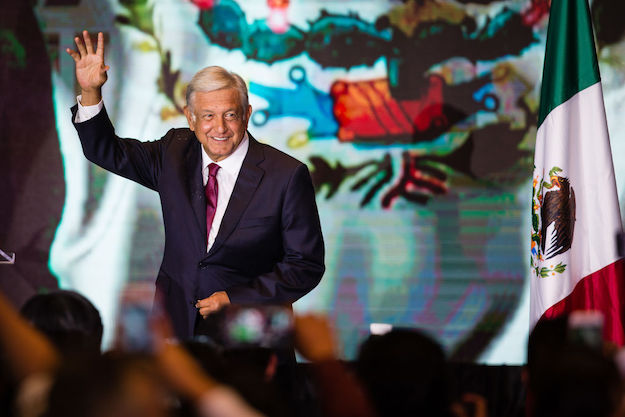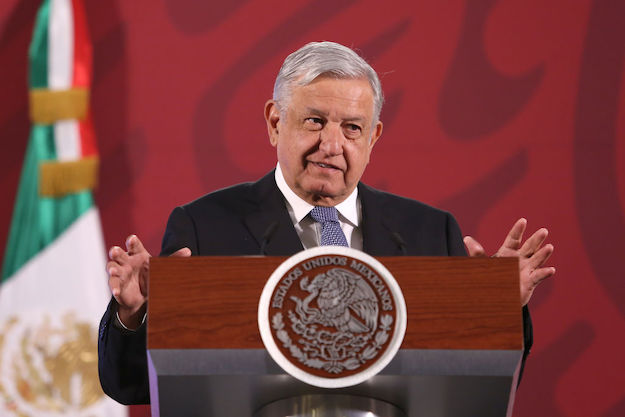MEXICO CITY – Voters in the United States traditionally use a president’s first 100 days in office to gauge where the country is headed. In Mexico, it’s after the first six months when new governments are first expected to take a look back and, where necessary, change course.
Andrés Manuel López Obrador, widely known as AMLO, hit the six-month mark on June 1, and while there’s still reason to think he’ll leave Mexico better than he found it – the subject of the second part of this essay, which will run next week – there are several areas in which the president is in need of a new approach. Here are four of the most important, and ideas for how he can turn things around.
International Absence
Foreign policy will find AMLO whether he likes it or not – as the still-unfolding drama with the Trump administration over tariffs and immigration makes clear. But the president’s personal lack of interest in the world risks ceding Mexico’s international clout and regional leadership.
López Obrador is the leader of the world’s most populous Spanish-speaking country and of one of its most important economies – a member of the small club of countries with a GDP over $1 trillion. He is also a leader of the Latin American left at a time when there are few other heads of state equipped to fill the role.
Despite this, AMLO has not left Mexico in two years and has rejected an invitation from the Japanese prime minister to attend next month’s G-20 summit in Okinawa. This is a mistake.
AMLO will miss the opportunity to stand alongside leaders like Germany’s Angela Merkel, France’s Emmanuel Macron and Canada’s Justin Trudeau, and articulate Mexico’s commitment to democracy and human rights. This is all the more vital at a time when democratic values are under assault from the likes of Jair Bolsonaro, Donald Trump and Viktor Orbán – a group of leaders whose distaste for institutions AMLO’s opponents accuse him of sharing.
Mexico’s place on the global stage has been hard-won – and should not be abandoned lightly. At the UN General Assembly in September, AMLO should take a (commercial) flight to New York and share both his vision for Mexico and his view of the challenges facing the global community.
Violence
AMLO inherited a scandalous security situation from his predecessors and today violence is the most pressing issue facing the country. Since former President Felipe Calderón unleashed an ineffective war on drug cartels in 2006, more than 245,000 people have been killed and 65,000 have gone missing, according to official records. To put that number in perspective, the U.S. government acknowledges roughly 5,000 American military deaths in the second Iraq war, while the Chilean government says that around 3,000 people disappeared during Pinochet’s military rule. The Mexican numbers are simply terrifying.
So far in AMLO’s term, such levels of violence have continued unabated, and the guns that kill Mexican civilians continue to flow in from the United States. Despite the fact that López Obrador says “there is no longer a war against the narcos,” at its core his security strategy resembles that of his predecessors. He is adjusting his approach, but far too slowly. This may prove to be an Achilles’ heel for the administration, because while violence affects all social classes it most directly affects the poor.
AMLO’s government has promised to work closely with the United Nations in training the newly created National Guard on issues of human rights, but this is not sufficient. As a result of trade negotiations with the Trump administration, Mexico will reportedly send 6,000 National Guard units to Mexico’s southern border. This will be a critical test for the new force, after very little time training for this new responsibility.
The president could take an important step to reduce violence in the long term by forcefully supporting an end to the prohibition paradigm and urging the Mexican Congress, dominated by his own party, to regulate the drugs market. Mexico should legalize cannabis nationally for both medical and recreational purposes before the end of 2019, while also opening a national debate regarding opioids and other drugs. AMLO should also insist on the U.S. government’s responsibility to address the illegal flow of arms to Mexico, and to fund more drug prevention campaigns in both countries.
Bridges to the Business Class
Rather than offering an olive branch to the portion of the private sector that always viewed his presidency with skepticism, López Obrador has antagonized business on many of its pet priorities. This is especially true when it comes to infrastructure.
AMLO’s controversial decision to cancel a $13 billion airport project outside Mexico City created a level of mistrust that will follow him throughout his presidency. The decision helped mobilize previously apolitical middle-class voters against him, and provided a catalyst for the “marcha fifí” and other protests in opposition to his government over the last six months.
The president’s own slapdash infrastructure plans do little to help his cause. The administration came up with a replacement plan for the canceled airport, but without first conducting the environmental and viability studies needed to be sure the plan would work. The resulting airport at Santa Lucía stands little chance of solving Mexico City’s airport saturation problem, much less of turning it into a hub for air travel in Latin America.
The so-called Tren Maya, a tourist train line planned for southeast Mexico, and AMLO’s refinery plans are similarly ill-conceived. The train project is missing key environmental impact studies and has not been carefully vetted with local communities that will be affected by its construction (indeed, the environment is another area in which López Obrador has fallen short). The administration has also failed to produce convincing evidence that the train will be used by tourists and local residents in the numbers they expect. Meanwhile, AMLO’s plan to build two new oil refineries, starting with one already underway at Dos Bocas, will draw needed investment away from Mexico’s six existing facilities, all of which are operating well under capacity.
Rather than sinking money into Pemex, AMLO should consider fostering the vast potential of Mexico’s green energy industries. Mexico is among the countries suffering most from the global climate emergency. Thanks in part to his overwhelming election victory last year, AMLO has the political capital needed to launch a radical energy program that could become a model for the region.
A Cultural Agenda
Mexican cultural clout has never been stronger. The country is home to the most important book fairs in the Spanish-speaking world, a wide array of festivals that attract tourism and promote learning, and the strength of Mexican cinema is clear to anyone who has watched the Oscars in the last five years. Mexican cuisine is similarly living a golden age, while Mexican Spanish is today the global reference point for the language of Cervantes.
But in his first six months, López Obrador has failed to articulate a strong program to expand cultural access at home and deepen Mexican cultural influence abroad. Nor has he come up with a way to make Mexican culture work to support efforts to build a more peaceful and equal society.
His proposal for a new cultural space in Chapultepec park, for example, has fallen short. López Obrador began his term with the symbolically important step of opening Los Pinos, the former presidential residence, to the public and converting a previously gated complex of government buildings in the park into a gathering place for all Mexicans. But the space will be designed by Gabriel Orozco, an established figure in the art world, rather than given over to a new generation of Mexican talent.
Mexican cultural prowess can help enhance our soft power abroad. But after six months in power, the new cultural authorities lack ambition and a long-term vision for projecting Mexico’s cultural power beyond our borders. The government should support the creation of a cultural institutes in our most important markets abroad, and work to design cultural programs to reduce violence in marginalized communities. Public grants and fellowships have been reduced rather than enhanced while the cultural authorities have not announced new cultural infrastructure projects, financed both by the public and private sector. This should change dramatically if the first leftist government elected in Mexico wants to leave a cultural legacy.
James Madison wrote that “If angels were to govern men, neither external nor internal controls on government would be necessary.” López Obrador is no exception. Six months represents a small fraction of the 72 AMLO will spend in office. He has so far committed too many mistakes, and has much to correct in his next six months. But AMLO also has legitimacy, power and authority on a scale never before seen in Mexico’s democratic history, and he is a pragmatic leader who listens to his constituents. Despite the errors I’ve outlined above, I’m optimistic that Mexico will be a better place at the end of AMLO’s six-year term than it is today – I’ll explain why when this essay continues next week.









